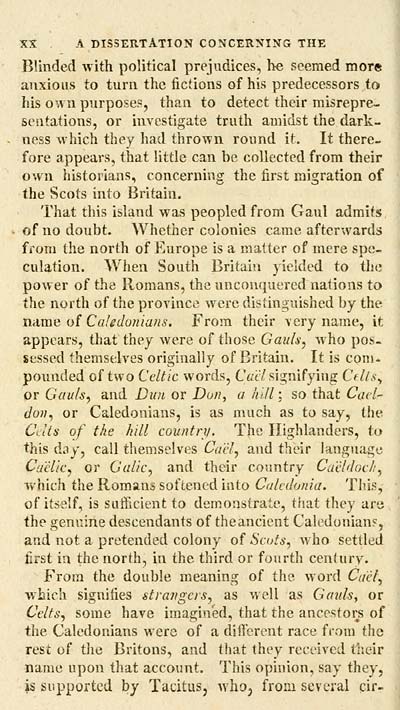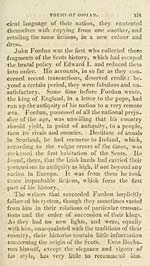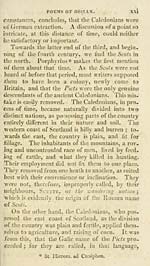Ossian Collection > Poems of Ossian > Volume 1
(38)
Download files
Complete book:
Individual page:
Thumbnail gallery: Grid view | List view

XX A DISSERTATION CONCERNING THE ;
Blinded with political prejudices, he seemed more
anxious to turn the fictions of his predecessors to
his own purposes, than to detect their misrepre-
sentations, or investigate truth amidst the dark-
ness which they had thrown round it. It there-
fore appears, that little can be collected from their
own historians, concerning the first migration of
the Scots into Britain.
That this island was peopled from Gaul admits
of no doubt. Whether colonies cam.e afterwards
from the north of Europe is a matter of mere spe-
culation. AVhen South Britain yielded to the
power of the Romans, the unconquered nations to
the north of the province were distinguished by the
name of Caledonians. From their very name, it
appears, that they were of those Gauls, who pos-
sessed themselves originally of Britain. It is conu
pounded of two Celtic words, C«c'/ signifying CV//>v,
or Gauls, and Dun or Don, a hill ; so that Cael-
don^ or Caledonians, is as much as to say, the
Cuts of the hill countri/. The Highlanders, to
this day, call themselves Ca'cl, and their language
Ccielic, or Galic, and their country Caeldoch,
which the Romans softened into Caledonia. This,
of itself, is sutTicient to dem.onstrate, that they are
the genuine descendants of theancient Caledonian?,
and not a pretended colony of Scots, who settled
tirst in the north, in the third or fourth century.
From the double meaning of the word Cael,
which signifies strangcis, as well as Gauls, or
Celts, some have imagined, that the ancestors of
the Caledonians were of a different race from the
rest of the Britons, and that they received their
name upon that account. This opinion, say they,
is supported by Tacitus, who^ from several cir-
Blinded with political prejudices, he seemed more
anxious to turn the fictions of his predecessors to
his own purposes, than to detect their misrepre-
sentations, or investigate truth amidst the dark-
ness which they had thrown round it. It there-
fore appears, that little can be collected from their
own historians, concerning the first migration of
the Scots into Britain.
That this island was peopled from Gaul admits
of no doubt. Whether colonies cam.e afterwards
from the north of Europe is a matter of mere spe-
culation. AVhen South Britain yielded to the
power of the Romans, the unconquered nations to
the north of the province were distinguished by the
name of Caledonians. From their very name, it
appears, that they were of those Gauls, who pos-
sessed themselves originally of Britain. It is conu
pounded of two Celtic words, C«c'/ signifying CV//>v,
or Gauls, and Dun or Don, a hill ; so that Cael-
don^ or Caledonians, is as much as to say, the
Cuts of the hill countri/. The Highlanders, to
this day, call themselves Ca'cl, and their language
Ccielic, or Galic, and their country Caeldoch,
which the Romans softened into Caledonia. This,
of itself, is sutTicient to dem.onstrate, that they are
the genuine descendants of theancient Caledonian?,
and not a pretended colony of Scots, who settled
tirst in the north, in the third or fourth century.
From the double meaning of the word Cael,
which signifies strangcis, as well as Gauls, or
Celts, some have imagined, that the ancestors of
the Caledonians were of a different race from the
rest of the Britons, and that they received their
name upon that account. This opinion, say they,
is supported by Tacitus, who^ from several cir-
Set display mode to: Large image | Transcription
Images and transcriptions on this page, including medium image downloads, may be used under the Creative Commons Attribution 4.0 International Licence unless otherwise stated. ![]()
| Early Gaelic Book Collections > Ossian Collection > Poems of Ossian > Volume 1 > (38) |
|---|
| Permanent URL | https://digital.nls.uk/77946734 |
|---|
| Shelfmark | Oss.79 |
|---|---|
| Additional NLS resources: | |
| Attribution and copyright: |
|
| Description | " ... to which are prefixed, 'Dissertations on the aera and poems of Ossian translated by James Macpherson'". |
|---|---|
| Shelfmark | Oss.79-80 |
| Additional NLS resources: | |
| Description | Selected books from the Ossian Collection of 327 volumes, originally assembled by J. Norman Methven of Perth. Different editions and translations of James MacPherson's epic poem 'Ossian', some with a map of the 'Kingdom of Connor'. Also secondary material relating to Ossianic poetry and the Ossian controversy. |
|---|
| Description | Selected items from five 'Special and Named Printed Collections'. Includes books in Gaelic and other Celtic languages, works about the Gaels, their languages, literature, culture and history. |
|---|

